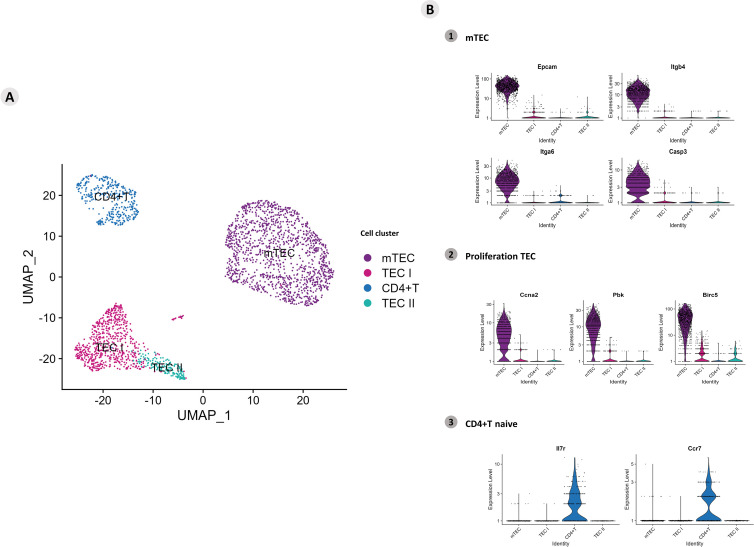The single-cell transcriptome of mTECs and CD4(+) thymocytes under adhesion revealed heterogeneity of mTECs and a network controlled by Aire and lncRNAs.
To further understand the impact of deficiency of the autoimmune regulator (Aire) gene during the adhesion of medullary thymic epithelial cells (mTECs) to thymocytes, we sequenced single-cell libraries (scRNA-seq) obtained from Aire wild-type (WT) (Airewt/wt ) or Aire-deficient (Airewt/mut ) mTECs cocultured with WT single-positive (SP) CD4+ thymocytes. Although the libraries differed in their mRNA and long noncoding RNA (lncRNA) profiles, indicating that mTECs were heterogeneous in terms of their transcriptome, UMAP clustering revealed that both mTEC lines expressed their specific markers, i.e., Epcam, Itgb4, Itga6, and Casp3 in resting mTECs and Ccna2, Pbk, and Birc5 in proliferative mTECs. Both cocultured SP CD4+ thymocytes remained in a homogeneous cluster expressing the Il7r and Ccr7 markers. Comparisons of the two types of cocultures revealed the differential expression of mRNAs that encode transcription factors (Zfpm2,Satb1, and Lef1), cell adhesion genes (Itgb1) in mTECs, and Themis in thymocytes, which is associated with the regulation of positive and negative selection. At the single-cell sequencing resolution, we observed that Aire acts on both Aire WT and Aire-deficient mTECs as an upstream controller of mRNAs, which encode transcription factors or adhesion proteins that, in turn, are posttranscriptionally controlled by lncRNAs, for example, Neat1, Malat1, Pvt1, and Dancr among others. Under Aire deficiency, mTECs dysregulate the expression of MHC-II, CD80, and CD326 (EPCAM) protein markers as well as metabolism and cell cycle-related mRNAs, which delay the cell cycle progression. Moreover, when adhered to mTECs, WT SP CD4+ or CD8+ thymocytes modulate the expression of cell activation proteins, including CD28 and CD152/CTLA4, and the expression of cellular metabolism mRNAs. These findings indicate a complex mechanism through which an imbalance in Aire expression can affect mTECs and thymocytes during adhesion.
Authors
Monteiro CJ, Duarte MJ, Machado MCV, Mascarenhas RS
External link
Publication Year
Publication Journal
Associeted Project
Systems Immunology of Human Diseases
Lista de serviços
-
RASL11A, member of a novel small monomeric GTPase gene family, is down-regulated in prostate tumors.RASL11A, member of a novel small monomeric GTPase gene family, is down-regulated in prostate tumors.
-
Splice variants of TLE family genes and up-regulation of a TLE3 isoform in prostate tumors.Splice variants of TLE family genes and up-regulation of a TLE3 isoform in prostate tumors.
-
Concepts on Microarray Design for Genome and Transcriptome AnalysesConcepts on Microarray Design for Genome and Transcriptome Analyses
-
The iron stimulon of Xylella fastidiosa includes genes for type IV pilus and colicin V-like bacteriocins.The iron stimulon of Xylella fastidiosa includes genes for type IV pilus and colicin V-like bacteriocins.
-
Origins of the Xylella fastidiosa prophage-like regions and their impact in genome differentiation.Origins of the Xylella fastidiosa prophage-like regions and their impact in genome differentiation.
-
The role of prophage in plant-pathogenic bacteria.The role of prophage in plant-pathogenic bacteria.
-
Genetic control of immune response and susceptibility to infectious diseases.Genetic control of immune response and susceptibility to infectious diseases.
-
Building capacity for advances in tuberculosis research; proceedings of the third RePORT international meeting.Building capacity for advances in tuberculosis research; proceedings of the third RePORT international meeting.
-
São Paulo School of Advanced Sciences on Vaccines: an overview.São Paulo School of Advanced Sciences on Vaccines: an overview.
-
A reasonable request for true data sharing.A reasonable request for true data sharing.

